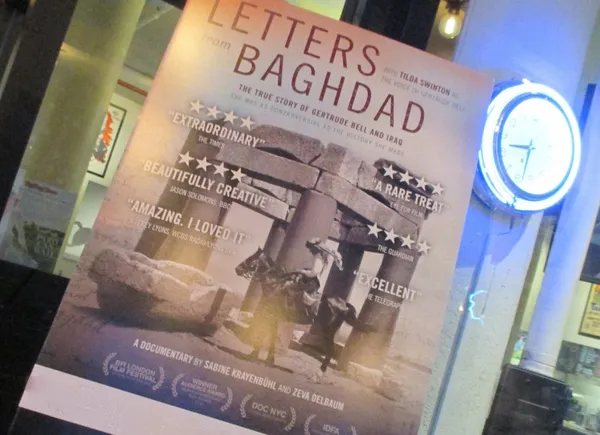 |
| Wonder women Thelma Schoonmaker and Tilda Swinton are executive producers of Sabine Krayenbühl and Zeva Oelbaum's Letters From Baghdad Photo: Anne-Katrin Titze |
On Friday, June 2, the opening night for Patty Jenkins's Wonder Woman (starring Gal Gadot) and Jonathan Teplitzky's Churchill (with Brian Cox as Winston Churchill, Miranda Richardson as Clementine Churchill, and John Slattery as Dwight Eisenhower), Sabine Krayenbühl and Zeva Oelbaum's Letters From Baghdad with Tilda Swinton as the voice of Gertrude Bell, a real Wonder Woman, had a sold out screening, discussion and audience Q&A at the Angelika Film Center in New York.
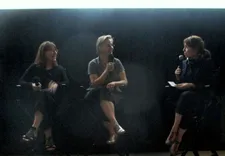 |
| Zeva Oelbaum and Sabine Krayenbühl's Letters From Baghdad post-screening discussion with Anne-Katrin Titze at the Angelika Film Center Photo: Carole Levy |
From being confronted by TE Lawrence to being an Ottoman Empire concern, Gertrude Bell overcame a remarkable number of barriers put in front of her and she did so on her own terms. The unusual, and in this case very effective, choice to have impeccably dressed actors (costumes by Allison Wyldeck) talk to the camera in their roles as Bell's contemporaries gives Letters From Baghdad a charming playfulness.
Fluent in Arabic and Persian, Oxford educated Bell, turned archeologist, diplomat, writer, photographer, cartographer, and suspected spy, had a fascinating life that far too few know about. Through an excellent selection of archival footage, mixed with her photographs, we are taken on a journey with a woman who was determined to make a difference.
At last year's DOC NYC, where their documentary was a highlight, Zeva and Sabine discussed with me the long journey to bring Letters From Baghdad to the big screen.
Anne-Katrin Titze: Have you ever seen Christopher Strong, the Dorothy Arzner film with Katharine Hepburn? I noticed some stunning parallels. Katharine Hepburn plays a pilot who has an affair with a married man and in the end she kills herself.
Zeva Oelbaum: Really? What's the name of it?
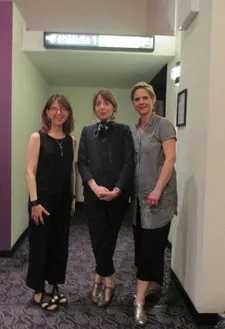 |
| Zeva Oelbaum, Anne-Katrin Titze and Sabine Krayenbühl on the opening night for Letters From Baghdad in New York Photo: Carole Levy |
AKT: Christopher Strong, it was one of her early roles.
ZO: Oh great, I love her.
AKT: I saw that Thelma Schoonmaker is one of your producers. How did she get involved?
Sabine Krayenbühl: She is like a mentor to me as an editor. I had mentioned to her in many conversations my obsession with Gertrude Bell and then at one point she sent me an article that mentioned all the books. So when we started making the film, I told her about it and she said she would love to help and support the film. So she became an executive producer.
AKT: So it was your obsession that started the project?
SK: We happened to be both obsessed. Our obsessions intersected on a film that we worked together. A film about another trail-blazing woman. That film was called Ahead Of Time [: The Extraordinary Journey of Ruth Gruber] and the woman's name was Ruth Gruber and we worked together in her apartment. I edited the film.
ZO: And I produced it.
SK: And I mentioned to Ruth, she might have known Gertrude Bell but she didn't. And Zeva had just read the biography. So we said, let's do it together.
ZO: We both traveled separately throughout the Middle East years ago, through lots of the different areas that Gertrude Bell traveled in. So we came to the book in very different ways.
AKT: "I have become a person" and "I am not a person". What is a person for Gertrude Bell?
ZO: That's really in such a wonderful way that she expressed in her letters to her family - what she's meaning of course was, she's a person of stature, she is being taken seriously. She is getting attention for who she is. Respect for her knowledge or her opinion. She is cutting real ice, you know, as someone would say. She is making a difference. That's how she was using that. What's really remarkable is that then at the end of her life, she says the same thing - "don't think that I am a person. Just because I'm busy, I am not a person."
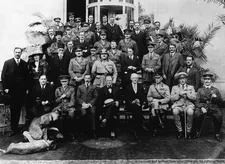 |
| Gertrude Bell and friends at the 1921 Cairo Conference Photo: Newcastle University |
SK: She lost the stature, she was no longer as respected. She faded back into her archeological work.
AKT: Her spirit left her, in a way. There is a line: "Perhaps there is not enough sun to keep us all warm?"
ZO: Oh, yeah, the anarchy of the universe! Isn't that stunning?
AKT: Have you seen the film version with Nicole Kidman?
SK: We've seen a little bit of it. It's interesting we started around the same time, actually a little bit before we started, the idea came up which was about seven years ago. Within three months of us deciding to move forward, we found out that Werner Herzog was going to do a film about Gertrude Bell and Ridley Scott was going to do a film about Gertrude Bell. And then Werner Herzog went ahead. It's mainly focusing on the romantic part of Gertrude Bell's story and not about her work.
ZO: Nothing about her work.
AKT: The love story begins with her first love, Henry Cadogan.
SK: The first one is played by James Franco. That's why there is a lot of attention, maybe.
AKT: The ending of your film brings us close to the present with the events of 2003. It was actually her collection in Baghdad that was ransacked. Was it always clear to you that you wanted to end on this note?
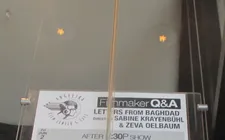 |
| Letters From Baghdad - Angelika Film Center box office Photo: Anne-Katrin Titze |
ZO: Yes. We want to reinforce the contemporary relevance. This is something where people would potentially say, "oh really? I remember those newscasts. I can't believe that this woman from a hundred years ago established this museum."
AKT: It effectively catapults you into the present.
SK: And when we started making the film, 2003 was almost over. The troops were removed from Iraq. And by the time we are now, the Middle East is again front and center of the news with borders being discussed, and the tearing down of archeological sites. There is so much relevance in terms of what happened then to see what's going on today.
AKT: I very much liked the actress [Michelle Eugene] who plays Dorothy Van Ess. We understand so much simply by her performance. How did you find her?
ZO: Casting. We felt what Dorothy Van Ess wrote about Gertrude Bell, really was able to give an objective, but loving portrait. So different than Gertrude Bell's family or colleagues. Dorothy Van Ess was an American looking at her wonderful British friend. But she was able to see her very clearly with all her faults.
AKT: I like how she comments "Of course, I have a university degree. And I do speak Arabic." Compared to those other people who think she is a snob! And I'm a snob, too! A lot of the photographs are stunning. Churchill with goggles, next to Gertrude Bell, and TE Lawrence on camels in front of the sphinx! What an image!
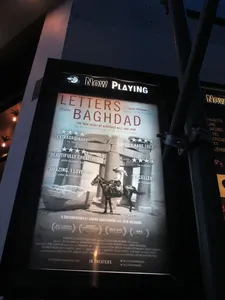 |
| Letters From Baghdad poster at the Angelika Film Center Photo: Anne-Katrin Titze |
ZO: That's obviously not a photograph that she took but she left 7,000 negatives. Some of them were these huge panorama negatives that were 11 inches wide and three inches deep and you see some of them in the film. She was a very serious photographer and her photographs are just amazing.
SK: That image is just so incredible. That she was there with the two men that are most well-known from that time period. And here is the woman that no one knows about, right next to them. You couldn't have a better comparison of the stature that they were on and what happened to them over the course of history.
AKT: Exactly. And Churchill in the goggles is the only one who needs to be protected this way. One last question about what I thought was a beautiful mirroring. That is the girls dancing around a maypole and the Whirling Dervishes. Were you intertwining them in one big dance, one international dance?
ZO: Sure. And the windmill!
SK: Form and movement that connects across the nations, across the country.
AKT: The maypole dance is going backwards the second time?
ZO: Yes. Very good!
SK: Yes, it's rewinding back to childhood.
AKT: Oh, that's good, I didn't think of it that way. Are you working on something new together?
SK: Yes, we are having some ideas.
ZO: We're percolating.
SK: We like the idea of digging out women that have been forgotten in history.
AKT: Thank you so much.
ZO: Thank you - those were good questions.
Read what Sabine Krayenbühl and Zeva Oelbaum had to say on the social circles of Virginia Woolf and Vita Sackville-West, Winston Churchill and TE Lawrence with Gertrude Bell in the desert, Whirling Dervishes, a maypole dance, costume designer Allison Wyldeck, and finding the right tone for Letters From Baghdad.
Letters From Baghdad is in cinemas in the US and UK.





















